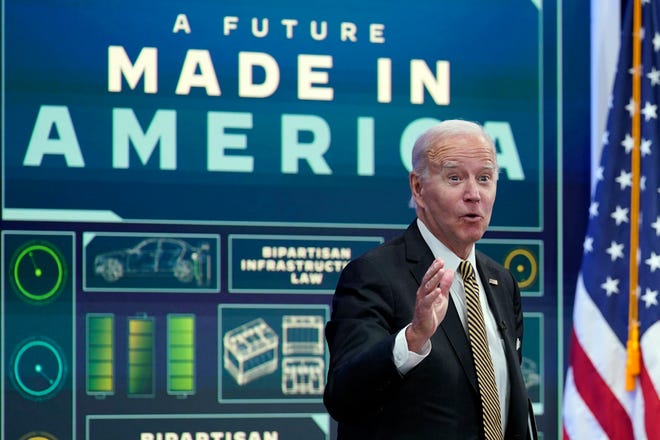Washington — The U.S. Department of Energy on Wednesday announced $2.8 billion in funding across 12 states for electric vehicle battery production. None of the projects — most of which focus on battery mineral processing or component manufacturing — are in Michigan, which remains the largest auto-producing state in the nation.
When asked why that is, DOE officials who spoke on the condition of anonymity said the reason is twofold: There was a rush to investment in battery cell manufacturing after the passage of the Inflation Reduction Act, which reduced the need for federal funding for that stage.
And secondly, the agency wanted to select projects located near the raw material supply or near their customers. Michigan’s Upper Peninsula is home to the only nickel mine in the U.S., one of the crucial components of EV batteries.

But that doesn’t mean Michigan won’t benefit from the influx of cash: It targets a portion of the EV battery supply chain that is particularly weak within the U.S. right now, experts say, and strengthening those links will help Michigan-based companies as they pivot to EVs.
There has been rapid growth in battery cell and battery pack assembly plants over the past three years, including in Michigan, said Sam Abuelsamid, a principal research analyst at Guidehouse Insights.
“But you have to have all these other components in order to produce those cells,” he said. “We’re now starting to see the rest of that domestic supply chain get filled up, and that will help to make the overall industry more resilient to future shocks.”
The DOE officials said there will be multiple rounds of funding and that Michigan projects might receive funding in the future depending on “which part of the supply chain we’re solving for.” The $2.8 billion in funding is the first round of battery investment from the Bipartisan Infrastructure Law, which was enacted last year. The law allocated more than $7 billion for critical materials and components for electric vehicle batteries.
The states with projects receiving funding include Alabama, Georgia, Kentucky, Louisiana, Missouri, Nevada, New York, North Carolina, North Dakota, Ohio, Tennessee and Washington. Most of the projects are in southeastern states, an area of predominantly foreign-owned, nonunionized automakers that is becoming known as the “Battery Belt.”
Only one project is in another Midwest state: Cirba Solutions will receive $75 million to expand a lithium-ion battery recycling facility in Lancaster, Ohio.
Companies selected are required to match or exceed the federal funding, totaling $9 billion in investment in the battery supply chain between the private sector and federal dollars. Administration officials estimate the investments will create 3,000 temporary jobs and 5,000 permanent jobs.
The selected projects will include production of an electrode binder that can supply around half of anticipated U.S. demand for EV batteries through 2030; a lithium processing facility in North Carolina; and the first lithium iron phosphate cathode facility in the U.S.
They will help create enough battery-grade lithium to supply 2 million electric vehicles annually, enough graphite for 1.2 million EVs and enough nickel for 400,000 EVs, the officials said.
President Joe Biden said the funding is a part of preparing the U.S. to compete amid “the most significant economic transitions since the Industrial Revolution.”
“Demand for critical materials is set to skyrocket by 400-600% over the next several decades,” he said during an event at the White House Wednesday. “Some see a challenge, but we see an opportunity to shift to a net zero” world.
Supplies of minerals such as graphite, nickel, lithium, cobalt and manganese are not expected to keep pace with demand as EV production grows. Both industry leaders and policymakers have identified mineral production and processing as major chokepoints in the transition away from gas-powered vehicles.
While Michigan is home to the country’s only nickel mine, most production of lithium and other materials happens elsewhere in the country — a reality based in each region’s unique geology.
“There’s always going to be some degree of spreading (production) out based on where the materials are in the ground,” Abuelsamid said. “So you have to be realistic about that.”
Otie McKinley, spokesperson for the Michigan Economic Development Corp., said it is “disappointing” that Michigan wasn’t selected for this round of funding, but that the state is “successfully competing for other significant federal funds to support this critical EV and mobility ecosystem.”
Bobby Leddy, spokesperson for Democratic Gov. Gretchen Whitmer, said the battery manufacturing gigafactories locating in Michigan — including recently-announced plans from Our Next Energy in Van Buren Township and Gotion in Big Rapids — “will need to source parts from across the country, so we are glad that the federal government is ensuring these components are American-made.”
“We are working to win (future federal grants) through our congressional delegation to keep creating thousands of jobs, securing billions of additional investment, and growing Michigan’s economy,” he said.
The administration also announced Wednesday it is launching the American Battery Materials Initiative, a plan to align investments across multiple agencies to build up battery mineral production and processing to meet the auto industry’s coming need for batteries.
Biden has made accelerating the transition to electric vehicles a top priority of his administration. Since taking control of the White House and both chambers of Congress, Democrats have passed billions to support EV charging, consumer tax credits, critical mineral production and processing, EV and battery manufacturing, and grid resilience.
The global auto industry is planning to invest around $515 billion over the next 10 years to develop and build EVs, according to the Alliance for Automotive Innovation. More than $98.6 billion of that has been committed to investment in the U.S.
rbeggin@detroitnews.com
Twitter: @rbeggin